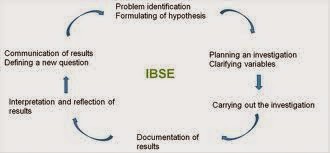IBSE: Gateway to SADC’s scientific development
Lazarus Sauti
With vast problems
bedeviling the Southern Africa Development Community, the region, without
doubt, requires a system of science teaching that is tailored to create
thinkers, inquirers and innovators.
The regional bloc needs
to promote inquiry based science education, as it is the only system that can create
thinkers as well as solving socio-economic problems hindering sustainable
development.
“Inquiry based science
education approach encourages children to question, conduct research for
genuine reasons, and make discoveries on their own,” notes Judith Johnson, an associate professor
of science education at the University of Central Florida.
Professor Roseanne
Diab, a member of the Academy of Science of South Africa, also says inquiry
based science education should be promoted as it focuses on student inquiry as
the driving force for learning.
“Teaching is organised
around questions and problems in a highly student-centered inquiry process, and
students learn through and about scientific inquiry rather than by teachers
presenting scientific content knowledge,” Diab says, adding that “learners are
encouraged to learn through exploring, discovery and investigation.”
Sameh Soror, an
Associate Professor of Biochemistry and Molecular Biology at the Faculty of
Pharmacy Helwan University and Director of the Centre for Scientific Excellence
“Helwan Structural Biology Research”, also adds inquiry based science education
advances science literacy of pupils.
“IBSE improves science
literacy of school pupils; teaches curiosity; and instills the willingness to
explore new ideas and reliance on evidence and logic,” he says.
Sadly, IBSE is not very
commonly used within most – if not all – SADC countries due to lack of in-depth
science content and concept knowledge of teachers in addition to lack of access
to quality resources and facilities for teaching.
More so, it is not used
since not enough time is dedicated for the in-service training of teachers.
This, therefore, calls for
policy decision makers in countries within and across the SADC region to sanction
the integration of inquiry based
science education into the school curricula, and support pilot projects to introduce inquiry based science education into schools.
Relevant stakeholders must
also lobby for the implementation of inquiry
based science education in training institutions, and approve financial and other resources for
developing teachers on inquiry based
science education.
“Policy decision makers
must endorse the integration of
IBSE into the school curricula; support pilot projects to introduce IBSE into
schools; lobby to strengthen current science curricula through the IBSE
approach; address the communication gap between practitioners, educators and policy-makers
involved developing curricula; and focus on implementing pilot workshops and
projects for teacher training and teacher trainers on IBSE,” according to a
policy-makers’ booklet titled “Inquiry-Based Science Education: Increasing
Participation of Girls in Science in sub-Saharan Africa”.
Nevertheless, Professor
Diab believes there is a need for science academies on the region to work mutually
in advising their governments on the importance and value of inquiry based
science education.
“Modern science
academies recognise, support and promote excellence in scientific research
performed by scientists who are citizens of a nation; promote contact among
scientists and the global scientific community; strengthen the global position
and role of scientific research performed by scientists; provide evidence-based
scientific advice to government; and increase public awareness of science in a
nation.
“Given their role
regarding the promotion of science education, and providing advice to their
governments, academies in the region are well placed to promote inquiry based
science education. There is, therefore, a
need for science academies on the African continent to work collaboratively in
advising their governments on the importance and value of inquiry based science
education,” she says.
For inquiry based science education to be the gateway to scientific
development in the region, science academies must provide evidence-based
policy advice to governments on IBSE – its features, successful contextual
implementation, advantages and disadvantages; lobby governments to adopt IBSE;
identify monitoring and evaluation mechanisms for implementing IBSE; assist
government in consolidating information on IBSE; forge partnerships with
academies where IBSE has been introduced and expand their knowledge on
implementation processes; offer volunteer assistance in classrooms; as well as
coaching and mentoring teachers on IBSE.
Without wasting time,
SADC member states must capture the opportunities and expand the application of
inquiry based science education programmes in primary and secondary institutions.
If the region wants to
develop, it must change and improving science education is the only gateway for
socioeconomic transformation in SADC.


Comments
Post a Comment